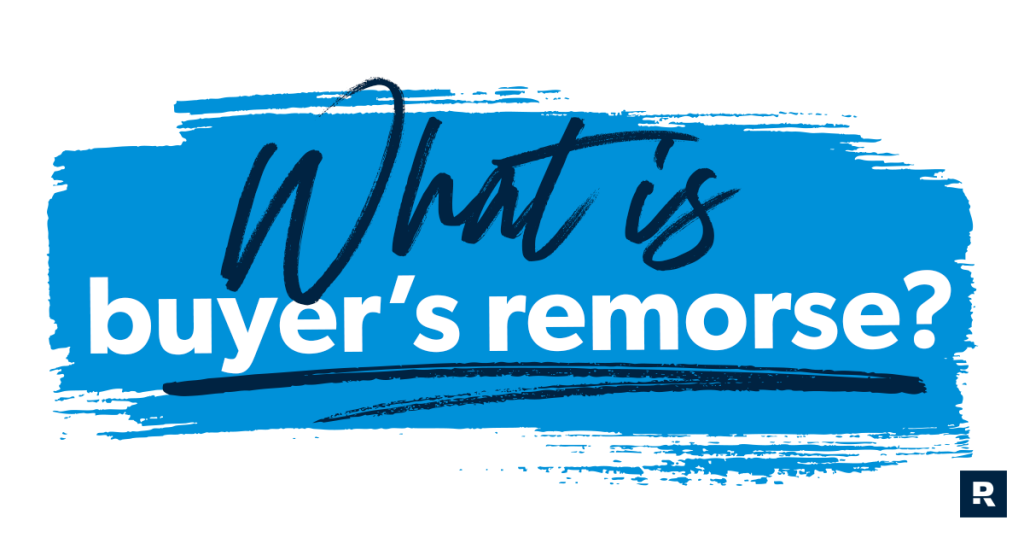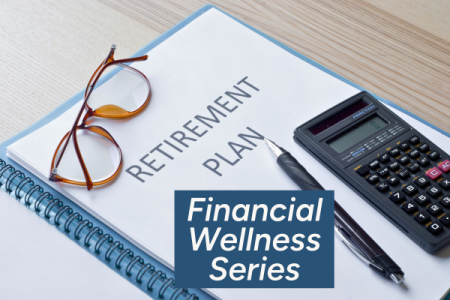When it comes to money, you’re either a spender or a saver, a free spirit or a nerd, an experience junkie or a lover of things . . . these are all tendencies that show up in the way we deal with our money. And while it helps to know why you handle money the way you do, there’s one thing that affects everyone no matter what your money tendencies are—and that buyer’s remorse.
You might feel buyer’s remorse every year after the holidays (and all the holiday spending). As you know, Black Friday and Cyber Monday make up one of the biggest holiday shopping seasons of the year. People love to shop the sales and stock up on gifts for themselves and others. But the word “sale” can be a siren song to so many (myself included) that leads straight to the pit of buyer’s remorse.
In fact, a recent study by Ramsey Solutions found that 42% of Black Friday and Cyber Monday shoppers admitted to spending more than they planned to.1 And 37% feel the weight of buyer’s remorse because they regret purchases they made on those shopping holidays.2 Ouch!
What Is Buyer’s Remorse?
Buyer’s remorse is the awful feeling of regret that can sometimes happen after you make a purchase—no matter how big or small. And it can happen when you least expect it. For some people, it can even hit just by stepping into a store!
Crazy, right? Well, not really. It’s all part of something psychologists call cognitive dissonance. That’s a $10-dollar term to describe the conflict you experience when your actions and beliefs don’t match up. It can happen in any aspect of life, but especially in the area of money (aka buyer’s remorse).
As a free spirit and a spender, I’ve felt the sting of buyer’s remorse too many times to count. One of my money tendencies is “status,” which means I can have a taste for the finer things in life. If I have the money in my budget, I’m drawn to spend it on name brands. And Jimmy Choo is one of those names in fashion I’ve always wanted to try.
One day, I was shopping at a department store, and there they were: a gorgeous, sleek pair of Jimmy Choo heels. They were calling my name! Better yet, they were on sale. I couldn’t resist the pumps I’d been pining for—or the great deal. So, I scooped them right up. But here’s the thing: Once I got them home and wore them for a while, I realized how uncomfortable they really were. There was no amount of breaking them in that helped—instead, they were breaking my feet!
Even though I got those beautiful heels on sale, I couldn’t help but feel the weight of regret for spending so much money on a brand name for a pair of shoes I couldn’t even wear!
What does buyer’s remorse feel like?
Buyer’s remorse feels like regret, guilt and even disappointment. Often, you go into a purchase with a ton of excitement—the hope that whatever it is you’re about to buy will change your life, be the highest quality, or fill some sort of need you have. But when that purchase doesn’t do any of those things, buyer’s remorse can set in—and fast.
I’ve said it before and I’ll say it again: It’s okay to have nice stuff, but don’t let your stuff have you. It’s true. When your stuff owns you, it doesn’t feel good. And if you go into debt for it, that feels even worse.
How long does buyer’s remorse last?
Buyer’s remorse can happen the instant you pay for something, or it can creep up on you a little slower and set in a few days (or even years) after you make your purchase. And there’s no set time frame for how long it might last.
Start budgeting with EveryDollar today!
Let’s say you bought a really expensive coat, just because you liked it. Nothing wrong with that, right? But after you get the coat home, you open up your closet and realize you have another perfectly good coat hanging right next to it (making your purchase seem frivolous). Your buyer’s remorse sets in because you’ve always believed that you shouldn’t live in excess. And owning two perfectly good coats that will keep you warm in the winter doesn’t really make sense. If you decide to keep both, you might experience buyer’s remorse every single time you open up your closet. But if you decide to give away your old coat or return the new one, your buyer’s remorse will disappear because you’ve fixed the root of the problem.
Like I said before, there’s really no time frame for how long it will last. It’s up to you to decide how long to let it plague you until you do something about it.
How to Avoid Buyer’s Remorse
Have you ever heard the saying “buyer beware”? It’s a law principle that reminds people to be smart with their money—to know what you’re getting before you buy. The idea isn’t just for contracts and big purchases like a home or a car. It rings true in every area of life. We have to be smart with our money decisions. But it’s hard! With so many products out there, how do you know for sure you’re going to love your purchase? Sorry to say it, but you don’t!
But don’t worry, I’ve got some tips on how to avoid buyer’s remorse before it hits. Remember, it all stems from conflict between your beliefs and your actions! So, when it comes to your money, you have to get on the same page—with your spouse, if you’re married, and even with your own actions and beliefs!
So, here are my favorite five ways to avoid buyer’s remorse (so you don’t have to deal with all that regret):
1. Budget.
If you know me, you know I love a good budget (although I didn’t always). That’s right—even a free-spirited spender like me can grow to love the budget. Can you hear all the nerds cheering right now, or is that just me?
A budget is the most important thing you can do for the health of your finances. When you budget, you’re telling your money who’s boss by giving every single dollar a job to do instead of wondering where it went. When you do a budget, you reduce your risk of buyer’s remorse. Why? Because a budget makes you think through every single purchase you’ll make for an entire month. Every single dollar is accounted for. Now, you just have to stick to it! Download EveryDollar (the world’s best budgeting app) and make your first budget for free.
2. Make a list.
I love a good list almost as much as I love a good budget. Especially when it comes to grocery shopping. It gives me a game plan for buying just the things I need. It also helps me stay on track when I get caught in the Dollar Spot at Target—again. (Everything is just so useful and cute!)
A list truly helps you shop for only what you need. But just like with a budget, you’ve got to do your part and stick to it!
3. Be content.
This one is a doozy. Haven’t you ever felt that twinge of comparison when you’re scrolling social media? Before you logged in, you were perfectly fine with your hand-me-down kitchen table. But a few scrolls later, you’re drooling over that handmade barnwood table your friend bought that costs more than you want to think about. That’s a buyer’s remorse trap! (I know because I’ve been there!)
Contentment is the answer, friends. When you’re grateful for the things you have (and not pining over the things you don’t), buyer’s remorse won’t be an issue.
4. Learn your money tendencies.
We all have unique ways of handling money—I like to call those money tendencies. And after talking with thousands of people about money, I noticed a pattern. There are seven different tendencies we’re wired with. Knowing where you fall on the scale of each tendency will help you learn where you need to set boundaries in your spending or even your thinking when it comes to money. Getting to know your money tendencies will help you avoid buyer’s remorse too!
Want to learn where you stand? Take the Know Yourself Money Assessment here.
5. Give it some time.
No matter how much you think you’ll love that new Peloton, give it time before you swipe your card. Wait a day or two (or even a month if it’s a big purchase like this one). If you wake up thinking about it (and it doesn’t break the budget), it’s probably a good buy! The key here is to imagine yourself with the item. Do you really need it? Do you think you’ll use it enough to justify the price? Or will it sit somewhere in your house collecting dust after those New Year’s resolutions are forgotten?
The great thing about time is that it gives you space to trick yourself into getting buyer’s remorse before you ever make a purchase. If you feel a sense of regret just thinking about making the purchase, it’s not a good buy.
What to Do When You Have Buyer’s Remorse
If you’re really feeling remorse about a purchase you just made, don’t worry. There are ways to deal with it so you can move on with your life (and get back to the budget).
1. Check the return policy.
Can you return the item? If you bought a new sweater—as long as the tags are still on and you have the receipt—consider that as good as returned! Make sure you check the store’s return policy. Most stores have a very specific time frame for returns. And if you’re past that, many stores will still take your return in exchange for store credit. But if you’re trying to return a service or even a car for that matter, you might have a bit more trouble getting your money back. Like I said, your best bet is to check the return policy. And if all else fails, it never hurts to ask!
2. Get to the root of the problem.
Maybe you have buyer’s remorse because you don’t normally spend money on yourself and you splurged a little (pandemic purchase, anyone?) In that case, you may want to spend some time working through the why. Get to the root of why you feel guilty for spending money. Once you do, you’ll feel that remorse fade away—especially when you come up with ways to help you work through those feelings in the future.
3. Consider selling or giving the item away.
Maybe you bought it on final sale or maybe you’ve been wrestling with your buyer’s remorse well past the return policy date. No matter what the reason, you could always try selling your item for what you purchased it for (or a little less). And if you can’t sell it, why not pay it forward and give it away to someone who might get good use out of it?
4. Use “The Cooling Off Rule.”
Turns out, the government actually has a rule in place to help you with buyer’s remorse. It’s called The Cooling Off Rule, and it helps consumers who may have been pushed into purchasing something they regretted later on. Often, these situations happen in one-on-one sales settings or door-to-door sales. Timeshare, anyone?
Yep—those people know how to get you to sign your name on the dotted line. And unless you want to spend your lifetime (and all your money) on a condo you can’t get rid of, buyer’s remorse will work in your favor. The FTC’s Cooling Off Rule gives you three days to cancel certain sales made in your home, a temporary place (like a hotel, restaurant or convention center), or even your dorm if you’re in college. Once you cancel, the seller has 10 days to cancel the sale or refund your money. Learn more about this rule here.
You guys, you don’t have to be burdened with the weight of buyer’s remorse every time you spend money. Who wants to live like that? Not me! Spending is a necessary part of our lives—you just need to know how to do it wisely.
That’s where Financial Peace University (FPU) comes in! This course walks you through everything you need to know about managing your money well (from paying off debt to saving for the future). Plus, in Lesson 5: Buyer Beware, I teach you how to be on the lookout for marketing tactics that threaten to bust your budget. Go ahead and start watching FPU now!
And if you really want to have more power over your purchases, you need to get on a budget. Download the EveryDollar app for free to start creating this month’s budget (and avoid next month’s buyer’s remorse)!
Read the full article here










